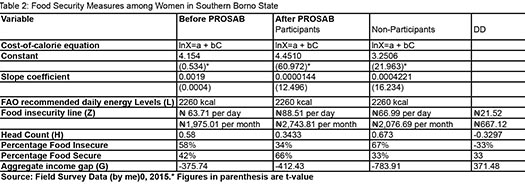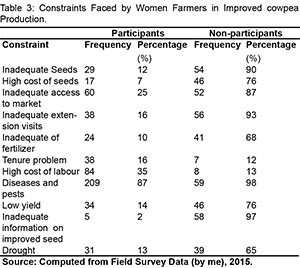I examined the impact of improved cowpea technology on women farmers which was introduced by the Promoting Sustainable Agriculture in Borno State, (PROSAB), project which was implemented from 2004 to 2009 in Southern Part of Borno State, Nigeria. The specific objectives were to identify the changes in income as a result of using improved cowpea varieties by the respondents, analyze the impact of the improved technology on the food security status of the respondents and identify the constraints associated with the use of improved cowpea varieties. Both primary and secondary data were used for the study. The primary data were collected by use of structured questionnaires administered to 240 farmers who participated in the PROSAB project and also planted the improved cowpea introduced (participants) and 60 farmers who did not (non-participants) to give a total of 300 respondents who were selected using a random sampling technique. The secondary data used include data from the baseline survey conducted when the PROSAB project was implemented in 2004.The Double Difference (DD), the Cost-of-calorie index and descriptive statistics were the analytical tools used to analyse the data collected. The DD is the difference between the income of both the participants and non-participants before implementation of the PROSAB project (2004) and after project has ended (the project ended in 2005 and this study was conducted in 2015).
| The results showed that there was a positive impact on income as a result of using the improved cowpea varieties (Table 1). The annual income of the participants increased by ₦143, 495.20 ($724.72) which was higher than that of the non-participants which increased by only ₦58, 500.00 ($295.45). The increase in the non-participant’s income was as a result of spill-down effect from those that adopted the improved cowpea technology. |  |
 |
The results showed that the food insecurity line, Z, which is the cost of the minimum energy requirements per adult equivalent, was determined as ₦1,975.01 per month before PROSAB. This was based on the daily energy level of 2250 kcal recommended by FAO (2009).With a head count of 0.58, it indicates that 58% of households were food insecure while 42% were food secure. The aggregate income gap (G) of -375.74 indicates that ₦375.74 was the amount needed by the food insecure households to meet their basic food needs (Table 2). |
|
The results of this study showed that the food insecurity line for the participants was ₦2,743.81 per month after PROSAB. The results also showed that the food insecure among the participants were 34% while 66% were food secure. The aggregate income gap was -412.43 implying that they need ₦412.23 to meet their basic food needs. This implies that food insecurity among the participants could have been reduced as a result of the PROSAB intervention. In the case of the non-participants, their food insecurity line was ₦2,076.69 per month after PROSAB. Only about 33% were food secured and 63% were food insecure and require additional ₦783.91 to meet their basic food needs. The DD indicates a positive difference of ₦667.12 between the participants and non-participants. This shows that the improved cowpea technology has had an impact on food security of the respondents. The women cowpea farmers were constrained by various factors like diseases and pests, high cost of labour, inadequate seeds, inadequate information and inadequate access to markets (Table 3). |
 |
I recommend that policies should be formulated to encourage women farmers in the study area to adopt and sustain the use of improved varieties of cowpea. Improved cowpea varieties and other inputs should be made readily available and accessible to the women farmers at affordable prices, on time and in adequate quantities. The women farmers in the study area should be given adequate enlightenment on how to control pests and diseases. The women farmers’ access to extension services and and number of contacts with extension agents should be increased especially for the non-participants.
Binta Ali Zongoma, Department of Agricultural Economics, University of Maiduguri, Maiduguri, Borno State. Nigeria (Click here for her 2017 update)
